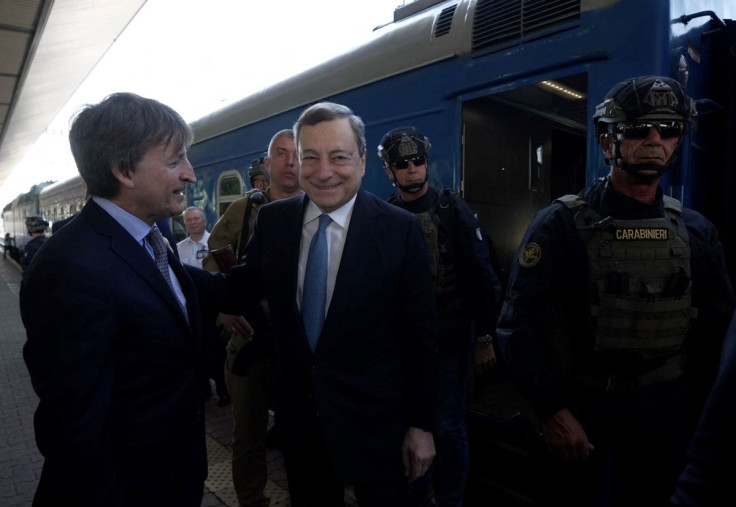German, French, Italian Leaders In Kyiv In Show Of Support

Several air raid sirens rang out in Kyiv as French President Emmanuel Macron, German Chancellor Olaf Scholz and Italian Prime Minister Mario Draghi started a joint visit to show support for Ukraine in its fight against the Russian invasion.
The three arrived in the Ukrainian capital early on Thursday after travelling together overnight in a train used to transport high-profile visitors to Ukraine.
"It's an important moment. It's a message of unity we're sending to the Ukrainians, of support, to talk both about the present and the future, since the coming weeks, as we know, will be very difficult," Macron said as they arrived.
Macron, who had been criticised at home and abroad for not travelling to Ukraine earlier, had repeatedly said he would only go if and when the visit could be "useful" and not be just a symbolic show of support.
It remained to be seen what concrete steps he would announce.
Romania's President Klaus Iohannis will join the three for talks with Ukrainian President Volodymyr Zelenskiy expected to touch on Kyiv's bid to join the European Union as well as the war itself.
The visit has taken weeks to organise with the three men looking to overcome criticism within Ukraine over their response to the war.
"We're here, we're focused, we will join President Zelenskiy to go to a war site where massacres have been carried out," Macron said.
BFM TV said the leaders were headed to Irpin, where Ukraine says Russia committed large-scale atrocities. Russia denies the allegations.
EU CANDIDACY
Asked why the visit was taking place now, an Elysee official said they had considered it was best to do it just before an EU summit next week that is due to discuss Kyiv's bid to join the 27-nation bloc.
The European Union's executive is expected to propose on Friday that Ukraine become a formal candidate for membership of the bloc, diplomats and officials say.
That would be a significant political gesture to the country as it resists Russia's invasion, but also something EU leaders are very divided on.
"A balance has to be found between Ukraine's natural aspirations to (join) the EU at a very special time, and attention to all the countries which already have candidate status and are stuck in the negotiation chapters and the fact that we must not destabilise the EU or fracture it," the Elysee official said.
Zelenskiy is expected to push his visitors to send more arms to help his hard-pressed army withstand the Russian invaders.
Kyiv has accused France, Germany and, to a lesser extent, Italy, of foot-dragging in their support for Ukraine, saying they have been slow to deliver weapons and of putting their own prosperity ahead of Ukraine's freedom and security.
A high-ranking official from an EU country said Zelenskiy was "in a really difficult position: the Ukrainian army not only needs weapons, but is also increasing lack of soldiers."
Oleksiy Arestovych, an adviser to Zelenskiy, told German newspaper Bild this week he was concerned the three leaders would put pressure on Kyiv to accept a peace deal favourable to Russian President Vladimir Putin.
Addressing this concern, Draghi said on Tuesday it was important for peace talks to open as soon as possible, but added they had to be "on terms that Ukraine deems acceptable".
Ukraine has been particularly critical of Germany's military aid and the country's ambassador to Berlin, Andrij Melnyk, told German broadcaster NTV he expected Scholz to hand over heavy weapons that had been long-promised but not yet delivered.
Scholz has dismissed allegations he has held back much-needed military support, saying Germany was one of the biggest military and financial backers of Ukraine, and that it was taking time to train Ukrainian soldiers to use the sophisticated artillery systems that it was offering.
© Copyright Thomson Reuters 2024. All rights reserved.







